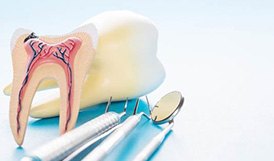Root Canal Therapy – Framingham, MA
A Virtually Pain-Free Way to Save Your Tooth
Are you terrified of needing a root canal? If so, you’ll be happy to know that the reputation of this tooth-saving treatment is much worse than the reality. In fact, many patients report that the process is no more cumbersome than having a standard filling done! So, if you’ve been struggling with dental pain or any other abnormal symptoms, don’t wait another day to schedule an appointment with Dr. Marianna Gaitsgory. Of course, you can also keep reading if you would like to learn more about this restorative dental service.
Do I Need Root Canal Therapy?
 Every six months, we recommend visiting us for a checkup and cleaning. That way, we can catch dental damage early on (ideally before a root canal is necessary). Between appointments, however, you should keep an eye out for the following symptoms:
Every six months, we recommend visiting us for a checkup and cleaning. That way, we can catch dental damage early on (ideally before a root canal is necessary). Between appointments, however, you should keep an eye out for the following symptoms:
- Persistent sensitivity to hot and cold foods and beverages
- Sharp pain when chewing
- Dark discoloration on one or more of your teeth
- Swollen, red, or inflamed gums
- A pimple-like bump on your gums
If you experience any of these, then contact our team right away to schedule an appointment.
The Root Canal Process
 The reason root canals are painless is because the first step of the treatment process is always the same: using a local anesthetic to numb your mouth. This will ensure that you remain completely comfortable through every step of the process, which starts with accessing the inner chambers of the tooth in question. After the pulp has been removed, our Framingham emergency dentist will sanitize the area, fill the open space with a synthetic gutta-percha material, and place a temporary dental crown over the top of the tooth. Once your permanent crown has been crafted by the lab artisans, you’ll return to our office so we can replace your temporary crown with this one. At this point, the treatment process is done!
The reason root canals are painless is because the first step of the treatment process is always the same: using a local anesthetic to numb your mouth. This will ensure that you remain completely comfortable through every step of the process, which starts with accessing the inner chambers of the tooth in question. After the pulp has been removed, our Framingham emergency dentist will sanitize the area, fill the open space with a synthetic gutta-percha material, and place a temporary dental crown over the top of the tooth. Once your permanent crown has been crafted by the lab artisans, you’ll return to our office so we can replace your temporary crown with this one. At this point, the treatment process is done!
The Benefits of Getting a Root Canal
 Getting a root canal will benefit your oral health in several ways. First and foremost, root canals save your natural teeth, preventing you from needing to extract the tooth and replace it with a dental bridge or implant. Secondly, the restorations used to protect your treated tooth are extremely lifelike, which ensures that your confidence isn’t compromised in the process and that no unwanted attention is drawn to your smile. Lastly, root canals have an extremely high success rate. As a result, many patients benefit from the results for decades, if not the rest of their lives!
Getting a root canal will benefit your oral health in several ways. First and foremost, root canals save your natural teeth, preventing you from needing to extract the tooth and replace it with a dental bridge or implant. Secondly, the restorations used to protect your treated tooth are extremely lifelike, which ensures that your confidence isn’t compromised in the process and that no unwanted attention is drawn to your smile. Lastly, root canals have an extremely high success rate. As a result, many patients benefit from the results for decades, if not the rest of their lives!
Understanding the Cost of Root Canals

Pain and price. Those are typically the two things that patients who need root canal therapy are concerned about. If you’re in the same boat, you’ll be happy to hear that the procedure is virtually painless and that our Framingham dental team is here to help you navigate the financial side of your treatment. In fact, we’ve even dedicated this next section to covering important information about the cost of root canals!
Factors That Can Affect Root Canal Cost

Since root canals are tailored to the patient’s unique dental needs, there isn’t a one-size-fits-all answer when it comes to the price. That’s why our Framingham dentist will first take detailed X-rays and conduct a thorough oral exam. From there, they will have a better understanding of the number of teeth affected, the complexity of your case, and the restoration you need. Before scheduling your next appointment, we will provide you with an estimate of the cost and review all of the financial solutions we offer.
Is it Cheaper to Pull My Tooth?

Not usually. After all, extracting your tooth is just the first step of restoring your smile. We also need to fill the open space with a dental bridge or implant, which comes with an additional cost. Plus, we always want to save your natural teeth whenever possible to preserve your bite, jawbone, diet, and overall well-being. If you’re interested in learning more about the price of root canal therapy compared to a tooth extraction, we’d be happy to provide you with more detailed information at your appointment.
Does Dental Insurance Cover Root Canal Treatment?

Sometimes, dental insurance providers cover a portion of the cost! If you aren’t familiar with your coverage or are unsure if you have any available benefits, don’t hesitate to ask us for help. We’re in-network with BlueCross BlueShield, Delta Dental, Aetna, and several other providers. Plus, even if we aren’t in-network with your dental insurance, we can still help you understand and utilize your benefits. In short, if you’re currently insured, it’s worth double-checking if your provider will cover a portion of the cost of root canal therapy.
Other Options for Making Root Canal Treatment Affordable

If you’re looking for another way to make the cost of essential restorative care more affordable, don’t worry – we have two! The first is CareCredit, which is a third-party financier that allows you to space out your payments over the course of several months. The second is our in-house dental plan. When you join, you get access to immediate benefits, like significant discounts on dental crowns. If you have a question about either of these options, give us a call so we can provide you with the answers you’re looking for.
Root Canal FAQs
Why Do I Need a Root Canal if My Tooth Doesn’t Hurt?
Although pain is one of the most common symptoms of a severely damaged tooth, it’s not the only one. A pimple-like bump on your gums, dental sensitivity, and bleeding gums are a few additional warning signs of decay and infection. If you ever have questions about the treatment being recommended to you, like why it’s the best way to restore your oral health, don’t hesitate to ask! That way, you can confidently move forward with the treatment plan presented to you.
Do I Still Need a Root Canal if My Toothache Went Away?
Piggybacking off of the last question, many patients are curious if they still need a root canal if their once-painful toothache has gone radio silent. The short answer is “yes.” There comes a point where the infection can “kill” the nerve of the tooth, causing it to no longer register pain. At this point, the infection can spread to your gums, teeth, and even the rest of your body through the bloodstream. So, it’s more important than ever to get the dental care you need.
How Much Pain is Normal After a Root Canal?
Thanks to powerful numbing agents and the latest techniques, you won’t experience any pain during the root canal procedure. A few hours after you return home, you may begin to feel some soreness kick in. At this point, it’s important to implement all of the aftercare instructions given to you, including taking OTC pain medication (as directed), sticking to soft foods, and keeping your mouth clean. Around the three-day mark, the discomfort should subside.
Can Root Canals Be Prevented?
Thankfully, you can dramatically reduce your chances of needing a root canal with a few simple habits. The first is brushing, flossing, and rinsing with mouthwash consistently. The second is getting a dental checkup and cleaning every six months. The third is eating a well-balanced diet filled with lots of nutrient-dense foods. Of course, it’s also important that you don’t adopt habits that can harm your smile, like smoking or not wearing a mouthguard during sports.
Do Root Canals Make You Sick?
You may have heard over the years that root canals can make you sick. This popular misconception stems from a poorly designed study from the 1920s. At the time, Dr. Weston Price claimed that this procedure didn’t remove all of the bacteria, resulting in illnesses. However, this theory has been debunked for several decades now. Furthermore, the opposite is true: if you don’t eliminate the infection, it has the potential to spread to other parts of your body, negatively impacting your oral health and overall well-being in the process.

